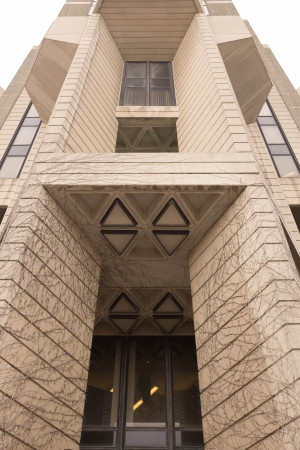Month: March 2015
Robarts Library
April
Close on the heels of the last period of exceptional activity, another such span is just beginning.
Today, I need to write a paper on Ross Zucker’s Democratic Distributive Justice, to be submitted by 6pm.
Monday, there is a Toronto350.org board meeting, where we will hopefully be able to finalize our by-laws. There is also a divestment planning meeting from 6-8pm, which conflicts.
Tuesday, I have my markets and justice course, and then the normal Toronto350.org planning meeting.
Wednesday, I have my first tutorials since the strike began. I have also been asked to take part in the dramatic reading of a play.
By April 10th, we need to have the final version of the divestment brief ready for the committee.
On April 17th, we are actually presenting to the committee.
By April 21st, I need to write another term paper for my markets and justice course.
And by the 1st of May, I need somewhere new to live.
Walter Gordon Symposium 2015
This year’s Walter Gordon Symposium was a thought-provoking discussion on public policy.
I also got to ask what, despite all the training beforehand, was the most surprising thing about flying in the space shuttle.
Brief update beta
Thanks to 72 hours spent awake and a star team of quick-turnaround proofreaders, we were able to get an updated version of the fossil fuel divestment brief to the ad hoc committee in time for their meeting tomorrow.
Also, there is a union meeting happening right now to decide if the strike should go to binding arbitration.
Now, I just need to finish photographing the Walter Gordon Symposium.
CUPE 3902 remains on strike
After working on the brief from 10am to nearly midnight yesterday, I decided to go to sleep without learning the result of the latest CUPE 3902 ratification vote. I had a difficult time of it, experiencing the worst headache I can remember for almost the entire night. I found that putting pressure on one part of my right forehead helped slightly to alleviate it.
This morning, I was surprised to see that the latest tentative agreement had been rejected, despite significant efforts from the union administration to push it: with most of them arguing for acceptance at the last general meeting, emails from the union calling for members to vote yes, and even robocalls from CUPE 3902 local chair Erin Black urging members to vote yes.
The breakdown of the vote ended up as 992 in favour, 1101 opposed, 4 spoiled ballots, and 27 rejected ballots.
At least one member of the bargaining team said she would resign if this tentative agreement was rejected. We will see if any other personnel changes take place, as well as what sorts of escalation will be put to use this week.
This is a critical time period for the strike. As of now, it’s still possible to salvage a reasonably normal semester, if an agreement is reached soon. TAs can begin with the backlog of grading, perhaps replace some missed tutorials and labs, and be available for final exam inviligation and grading. If the strike goes on much longer, however, that option becomes less and less plausible and the possibility of the university invoking some sort of academic continuity policy to make TA labour unnecessary rises. The extension of the term into the ‘summer’ (which at U of T means ‘May’) also seems to become more plausible.
I am going to keep doing photographic work and picketing as much as I can, while still trying to get the brief update done before the ad hoc committee meets on the 27th…
Some lessons from the strike
I wrote this before seeing the result of the latest CUPE 3902 ratification vote.
One element of the strike for which I am grateful was being able to meet so many fellow students and teachers on the picket lines. I have often likened U of T to an amoeba with no centre – just a collection of loosely bound parts which are considered in some rough sense to be a single organism. Being out on the pickets has exposed me to a wider variety of fellow U of T people than anything that has happened before during my three years here. I have dozens of new people to follow on Twitter.
The strike has also been another example of a political struggle against difficult odds, and the way in which the strength of a moral argument is often overwhelmed by the relative power of those involved in it. The strike has also been a demonstration of how difficult it is to even bring people to the fight. Only a small subset of CUPE members ever showed up on the picket lines and an impossible-to-fully-know but at least moderate proportion just kept working.
The strike also demonstrated tensions between hierarchy, democracy, and strategic success. All the picket line chants were about democracy and universal involvement, but the union administration is inevitably an entity with interests of its own. It’s certainly hard for 6,000 people to make any kind of coherent decision – especially when those who are best informed tend to favour secrecy the most, and when there is a militant band full of enthusiasm for shutting down any public discussion aside from pep and slogans in the name of tactics and strategy.
For the big fights confronting us – climate change, most notably – we need to deal with both of those problems: find ways for the moral demands of the many to win over the entrenched power structures of the few, and find ways to make people active, political, and part of movements that can win.
CUPE 3902 meeting and Fellows’ Gaudy
Yesterday afternoon, CUPE 3902 met to decide whether to send the latest offer from the university to the full union for ratification. The deal includes the same reworked funding and tuition numbers from the union’s last proposal, but without the structural changes to the funding package that many saw as the realistic best-case outcome for the strike.
I had to leave the meeting an hour before the end to get to the Massey College Fellows’ Gaudy, the last high table of the year. We learned later in the evening that those present at the meeting had voted narrowly in favour of sending the deal to a ratification vote.
The vote is happening today and tomorrow, and could conceivably result in us going back to work Monday. If so, I will be in even more trouble than before. My cold has become substantially worse, and a return to work will mean a sudden avalanche of grading – all six days before the brief update is meant to be finished.
More thoughts about the strike
I am in a bit of a vise right now. Nobody else can finish the fossil fuel divestment brief update, but the strike and picket duties are ongoing. Even totally neglecting my PhD work, reconciling the two is impossible. And now I have come down with a cold.
The prospect of pulling back from union duties is uncomfortable. The University of Toronto’s position remains unconscionable. They are failing to recognize how running an institution of learning requires mutual respect, and some respect for social justice. Being unable to be fully effective for two social justice fights – and two distinct groups of allies – is vexing.
Tomorrow afternoon there is a union meeting to discuss the latest offer from the employer. It is based in a way on the proposal from our meeting last Friday, where we decided to give up on aspirations like poverty-line pay for TAs in exchange for structural gains in the contract: recognition that tuition and the funding package are appropriate bargaining items for the union, and that funding assigned to individuals makes more sense and is more just than pools of funding that must be split among as many TA graduate students as the university cares to admit. The offer from the administration being voted on tomorrow jettisons the structural gains being sought, raising questions about what purpose the strike has served and how much more corroded and precarious the position of graduate students at U of T will become.
As far as TA work goes, I am happy to strike for as long as is required to get a deal with real gains. At the same time, the special burden of completing the brief weighs heavily on me.
Today
- Take the bus to U of T Mississauga, reading for my markets and justice class on the way
- Picket and photography shift in Mississauga
- Keep reading on the bus back
- Markets and justice seminar
- Work on the brief and photo post-processing
- Toronto350.org weekly planning meeting
- Work on the brief and photo post-processing
Hopefully tomorrow’s shift will be back at the downtown campus.


